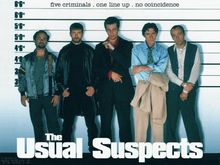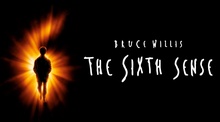Why Spoil A Good Thing?
 It’s almost impossible for me to avoid movie spoilers. If it isn’t reviews (some of which aren’t very careful) articles on specific or general movie features, actors, genres, etc. then it’s discussions on social media.
It’s almost impossible for me to avoid movie spoilers. If it isn’t reviews (some of which aren’t very careful) articles on specific or general movie features, actors, genres, etc. then it’s discussions on social media.
And if this wasn’t enough, we live out in the country, a fair distance from any theatres, and often the logistics of movie-going are difficult enough that we just don’t go. For years now, with very few exceptions, we’ve been seeing movies for the first time when they come out on DVD, or more recently, on Netflix*.
Many people must be experiencing delays of some sort in their movie viewing, however, since the phrase “spoiler alert” appears to be almost mandatory in any discussion. At one point, people were even arguing about whether there was ever a time when a movie became “spoiler free” because of age. How old does a movie have to be before you can assume the person you’re addressing has had more than ample chance to see it? I’m always surprised when people haven’t seen Casablanca, or something else of that age and significance, but they are out there.
 The odd thing is, I’ve found I don’t mind having movies spoiled. First, because it’s possible, even likely, that I’m not going to see the movie anyway. Second, and more important, I’m a writer.
The odd thing is, I’ve found I don’t mind having movies spoiled. First, because it’s possible, even likely, that I’m not going to see the movie anyway. Second, and more important, I’m a writer.
There are two kinds of spoilers when you think about it, and they’re not of equal weight. The first, lighter, type is revealing certain specific details, or particular scenes, or even jokes. Any of these might spoil a viewer’s enjoyment of a film for a moment. Then there are spoilers that reveal a “twist” ending, the kind of thing where the makers of a film will actually ask people not to give the ending away.
The first movie I remember having this type of twist was The Crying Game. Not a genre film in the sense we usually think of it, but definitely a case where knowing too much on the way in could spoil the experience for you. There are a couple of others that come to mind more quickly, however, starting with The Sixth Sense, or The Usual Suspects, or Fight Club. I particularly like The Illusionist, but it seems not that many other people have seen it.
 Come to think of it, a lot a “heist” films that depend on some kind of con-game (Ocean’s Eleven, The Italian Job) usually involve a twist of some kind – the point being that viewers, like the marks in the film, are being more-or-less deliberately led astray.
Come to think of it, a lot a “heist” films that depend on some kind of con-game (Ocean’s Eleven, The Italian Job) usually involve a twist of some kind – the point being that viewers, like the marks in the film, are being more-or-less deliberately led astray.
You’d think, if spoiling was so horrible, that people could only watch these films once, wouldn’t you? But they don’t, they watch them over and over. Why doesn’t it matter to them that the movie’s been spoiled?
Sometimes I think knowing the “secret” “twist” ending doesn’t spoil the movie for you, it just changes your experience of it. There’s a certain poignancy in some cases, an extra emotional layer to certain scenes because you know something’s coming and the character doesn’t. That’s what dramatic irony is. It worked for Shakespeare, no one says “spoiler alert” to Richard III.
Speaking of which, writers have a different relationship with spoilers, I think. When someone is excited enough about a movie to tell me about it, their excitement is more important to me than the movie. I want to know why. This is particularly true when the person I’m talking to is another writer, they’re usually telling me about something that was very well, or very badly done. That’s more important to me than the movie.
If we can’t live spoiler-free lives, maybe we should learn to embrace the spoilers?
*Netflix, like “Kleenex,” is quickly becoming the generic termhrViolette Malan is the author of the Dhulyn and Parno series of sword and sorcery adventures, as well as the Mirror Lands series of primary world fantasies. As VM Escalada, she writes the Faraman Prophecy series. Book One, Halls of Law, is out now; Book Two, Gift of Griffins, is available for pre-order. Find Violette on Facebook and follow her on Twitter @VioletteMalan.
I hear what you’re saying – re how knowing what’s ahead can change your whole perception of a film, often in a good way – but I still wonder how ‘Angel Heart’ would have struck me if my brother hadn’t told me the twist in advance.
I suppose everyone has, to some degree, an “ample chance” to see a film, but that doesn’t mean they’ve seen it. I guess I’m of the opinion that everything from Intolerence to Avengers should be spoiler free because I don’t want anything to take away from the pleasure of experiencing the story the way it was intended by the producer/director. Tell someone who’s just sitting down to watch The Wizard of OZ the ending, and would they even want to watch it? Well, maybe for the music. So I’m firmly in the no-spoiler camp.
I have kind of mixed feelings on spoilers for myself — a lot of it depends on the specific example in question — and I won’t try to deliberately spoil something in one-on-one conversation (unless you specifically tell me, “Go ahead! Spoil away!”), but I do think that sometimes the Spoiler Police to start to get a bit carried away, like when they’re getting upset about someone spoiling, well, The Wizard of Oz, for example, as part of a general conversation.
I think you’re right that “spoilers” often don’t spoil watching a movie, or re-watching a movie. That being said, I think some movies are not that great on re-viewing once you know the spoiler. I was blown away by 6th Sense when I saw it in theaters. And I remember watching it the second time to watch all of the hints and try to catch where I thought the movie contradicted itself (Willis and Collette staring at each other in opposing chairs). But I have to admit that after that second watch, I think it’s a boring movie to sit through on subsequent viewings. I don’t feel that way about Fight Club or, say, The Village. I’m not sure why Sixth Sense doesn’t really hold up.
I usually pick up works of any type that interest me a good while after they have gained a high reputation. It’s seeing people continuing talking about it that makes me become interested in them. But the decision to actually read/watch/play them myself usually comes after I went to find out what the whole deal is about.
You could say, spoilers make me care in the first place.
But I am very much in agreement that these things are way less relevant than most people make them out to be. I can’t really think of many works that rely on not knowing what happens later. There are works that rely on not knowing, but then it is not knowing ever. And those are impossible to spoil. At the most, seeing the entire work for yourself only makes you appreciate the complexity of the mystery more.
And I also think that this expectation of huge twists and surprises has been a great misstep in entertainment. It’s easy to get hype for a question, but very difficult to come up with a satisfying answer. I can’t really think of any works that are centered around a big mystery and had a well received ending. I think writers should look more for ways to make stories engaging without relying entirely on the audience waiting eagerly for the information the writers are witholding from them.
A certain psychological horror film that will remain nameless is one I never would have seen without spoilers. I love ghost stories, but my threshold for horror is relatively low. A friend said, “Watch it as a comedy. The main character thinks the new owners of her house are the ghosts, but she and all the people she can see are the dead ones. All the other dead people have figured it out , too, but she’s too stubborn and volatile to admit to being dead. Think of it as Fawlty Towers in the afterlife.” Watched that way, the film was hilariously brilliant. People who love horror generally found it terrifyingly brilliant. Everybody wins.
to Aonghus: I’ve never seen that film, please tell me the twist so I’ll know. Seriously, I’d like to know
To RK: I agree people should take care not to spoil a film that someone hasn’t seen, but feels they would likely see. In my case, the only thing that might make me decide not to see the movie is if you gave me a scene by scene breakdown of the narrative. If what you tell me is the ending, or the twist, I’d still want to know how the writer/director gets there.
To Joe H. Mixed feelings probably describes what I’m experiencing as well. One-on-one is the only situation you have some control over, but I’ve had people refuse to tell me important things about a movie even though I’ve assured them that I would never watch the movie under any circumstances. If you were using a film to make or illustrate a point in discussion, I’d like you to go ahead and make that point. The discussion is more important to me than the film.
To James: For me, the emotional notes in 6th Sense are still interesting, but not the plot itself, if you see what I mean. There are some movies, like Fight Club or The Usual Suspects, where the quality of the acting sometimes carries the whole weight, and you can watch it again and again. With the Illusionist, since I don’t watch it very often, I occasionally find myself falling for it again, and doubting my own memories of what happened. That’s fun.
To Martin: I think you’ve hit on something here. If the story is engaging, well-imagined and well-presented, then who cares if they already know how it ends? I think again of Richard III, where he tells the audience exactly what he’s going to do, and then does it. Couple this with the fact that the play’s historical, that is, you already know what happens to Richard, and you’d think no one would want to watch it again. And yet, not so.
To Sarah: Not a big horror fan either, though particular works do work for me. Shifting your perspective is an interesting way to enter such a movie. I agree that in that case, you actually need the movie spoiled for you, that in fact it only works if it has been spoiled. I think that fits with what I was saying about writers looking at movies, etc. in a different way.
Violette – I haven’t seen ‘Shutter Island’, but I know enough about it to see certain corollaries with ‘Angel Heart’. 😉
The explanation (the ‘how’) in ‘Angel Heart’ is absurdly complicated though, which might have diminished its impact if you were watching it unprepared- as opposed to, say, ‘The Sixth Sense’, where you instantly grasp what’s going on.